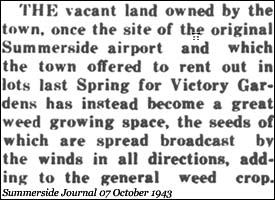The Summerside Town Council took concrete steps to encourage gardening by deciding to convert the old civic airport into 150 lots at a rental fee of $5 an acre. Notices appeared in the local newspapers in May of 1943. Apparently there was not much interest on the part of citizens, as evidenced by a paragraph in the 7 October Journal which referred to the old airport land "growing up in weeds."


During 1943, the federal Agricultural Supplies Board placed notices in the press to promote the cause and offered a free pamphlet called "The Wartime Garden." Many local households had small kitchen gardens for growing vegetables and there were numerous fruit bearing trees and shrubs around town. In the summer of that year, the local Girl Guides participated in a contest for growing a good garden.
The spring of 1944 brought another round of press releases and a regular column in the Agriculturalist of Summerside called "Answers for Victory Gardeners." An article in the same paper in August 1944 indicated that there had been more than 200,000 wartime gardens in Canada in the previous year.
In 1945 another series about gardening appeared. Sharing the common title "Canadian Garden Service," the articles provided plenty of information about the process, including the planning of kitchen gardens.
The best example of a full-fledged Victory Garden in the Summerside area was the one at RCAF Station Summerside. The Commanding Officer noted the success of the school's large garden in his diary on September 30, 1944 - "There was approximately 6400 pounds of produce picked from the Victory Garden during the year."
| Related Articles | Related Images | Related Memories | Related Websites | Inflation Calculator |
| Home Page | Site Map | Contact Us | Wyatt Heritage Properties |





